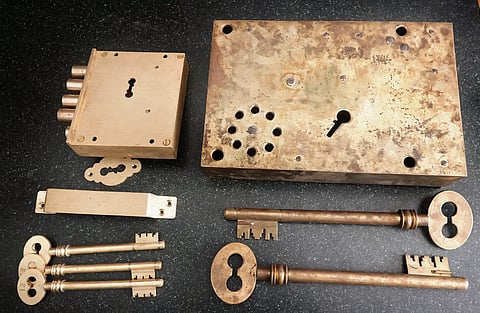

DINDIGUL: For over 200 years, Dindigul has been synonymous with locksmithery, producing some of the most high-quality, durable and intricate locks in India. Whether it is the sturdy mango lock or the rare ‘vichitra pootu’, locksmiths in and around Dindigul town have spent generations perfecting their craft. Made from scrap metal, steel, or brass, each lock features a precision lever mechanism and a unique key code designed to withstand force, tampering with, and time itself. From securing ancient temples to British-era estates, these locks embody a legacy of trust that spans centuries.
The origin of Dindigul’s lock-making industry remains difficult to trace, but its dominance in Tamil Nadu is undeniable. Archaeologist Narayana Moorthy explains that for over two centuries, temples, traders, and colonial officials relied on Dindigul locks not just out of tradition, but out of necessity.
“These locks weren’t just strong; they were nearly impossible to breach,” he says. “Zamindars, traders and even the British East India Company swore by their durability. Even today, century-old mansions are secured using Dindigul locks.”
The cottage industry of locksmiths thrives in areas such as Begumpur, Nagal Nagar, Sandai Pettai, Nallampatti, Kudai Paraipatti, Yagapanpatti, and Kammalapatti. In modest workshops, the rhythmic clanking of metal fills the air as artisans shape raw materials into intricate locks.
G Prakash (45), a fourth-generation lock maker, is one of the many artisans preserving this craft. His great-grandfather, Pattan Arasi, began his career as a horseshoe craftsman in the late 19th century before shifting his focus to locks. Seeing a growing demand for secure locking systems, he started crafting mango locks, also known as mangai pootu.
“My grandfather, Periyasamy Arasi, mastered the art and by the 1940s, he was one of the most sought-after locksmiths in Dindigul,” says Prakash. “He handcrafted over 10,000 locks in his lifetime. People lined up outside his workshop to get their hands on one of his creations.”
The mango lock, named for its distinctive shape, remains one of the most iconic Dindigul locks. Prakash and his family continue the tradition, crafting mango locks in eight different sizes (1.5 inch to 10 inch) —from small 300-gram versions used in homes to massive 10-kg models built for securing temple vaults.
As a testament to his devotion, Prakash has donated handcrafted locks to temples, including a 9-kg brass lock for the Lord Murugan temple in Tiruchendur and 8-kg locks for the Sarangapani and Chakrapani temples in Kumbakonam. The cost is estimated to be around Rs 16,000-Rs 17,000 for each such brass lock.
“Many don’t realise that factory-made locks have just 100 key patterns, meaning a key bought in Chennai could unlock a lock purchased in Madurai. Mango locks are handmade with unique keyholes that cannot be duplicated. Cheap locks, on the other hand, can be broken easily with a crowbar or iron rod,” adds Prakash.
While the craft of locksmithery is steeped in history, it is not immune to innovation. S Pradeep Kumar, a third-generation locksmith, has spent years developing unique lock mechanisms that blend security with complexity.
“My grandfather, Natarajan, was an expert in a rare kind of lock aptly named vichitra lock,” Pradeep explains. “It required two different keys—one to lock, one to unlock. If you mixed them up, you were stuck. This type of lock is extremely rare, weighing between 600 to 800 grams, and priced from Rs 700 onwards. Unfortunately, the only craftsman who could make them passed away, and the technique has been lost.”
While the vichitra lock is now a relic of the past, other complex designs continue to thrive. Election officers, for example, use double-key mango locks that require two separate keys to open. The Raj Round Lock is another innovation—this lock demands precise twists in a single direction to function. One wrong move, and the lock remains shut.
“Jewellers prefer lockers as they allow for stacking valuables in multiple layers. The smallest variant begins at 12 inches in height, 14 inches in width, and 10 inches in depth, with most lockers custom-made to meet specific requirements,” adds Pradeep.
Despite its history and reputation, Dindigul’s lock-making industry faces stiff competition from mass-produced locks flooding the market from North India. These factory-made locks, often cheaper and produced in bulk, have made it harder for traditional locksmiths to sustain their business.
Recognising the importance of this indigenous craft, the Dindigul Lock Workers’ Industrial Co-operative Society Limited. was established in 1957 to support local locksmiths. However, many artisans argue that government backing remains inadequate. Reasons for the decline in the lock-making tradition of the region are many — logistical challenges, rising material costs, refusal of artisans to adopt modern technology, an unorganised workforce, poor wages, disinterest among younger workers to learn the craft and a lack of substantial government support.
The industry received a much-needed boost in 2019 when Dindigul locks were granted a Geographical Indication (GI) tag.
The GI tag primarily helps in providing legal protection to makers of a product unique to a specific location. This recognition formally acknowledged the uniqueness of Dindigul locks and its deep-rooted connection to the region’s history.
For now, the rhythmic clanking of metal against metal continues in the narrow lanes of Dindigul, where skilled hands shape locks that should not become relics of history.